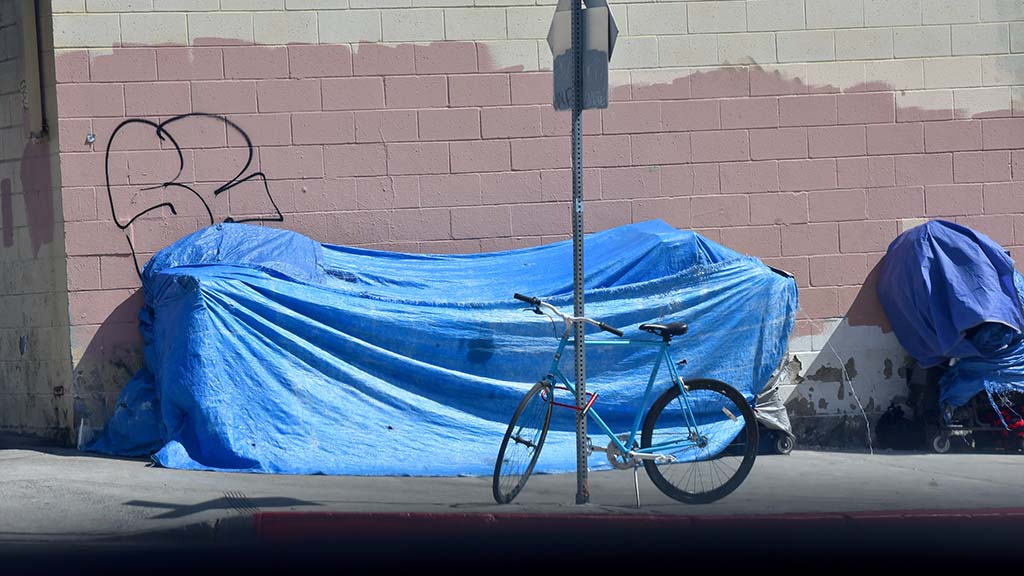San Diego Looking for Buildings to Create Shelters Throughout City
The call, officially known as a request for information, comes as several shelters are slated to close in coming months and Mayor Todd Gloria's efforts to establish a proposed "mega shelter" remain under negotiation.



As the city struggles to find shelter space for its thousands of homeless residents, San Diego city leaders Friday put out a call asking for property owners to offer up locations as future shelter sites.
The call, officially known as a request for information, comes as several shelters are slated to close in coming months and Mayor Todd Gloria’s efforts to establish a proposed “mega shelter” remain under negotiation.
“We’ve doubled capacity at our sheltering options, but clearly more needs to be done so that San Diegans continue to see encampments being addressed and our unsheltered neighbors get connected to services that will help end their homelessness,” Gloria said.
“While ample affordable housing is the only true solution, we must address the current crisis on our streets as we build thousands of new supportive units.”
Within the past year, San Diego has expanded traditional shelter and Safe Sleeping site capacity by more than 930 beds. However, accoridng to January’s point-in-time count conducted by the Regional Task Force on Homelessness, around 3,000 people in the city do not have shelter.
Future developments at Golden Hall, Father Joe’s Paul Mirabile Center, and the Rachel’s Promise Shelter, along with the scheduled closure of several temporary shelters, means that the city’s current shelter bed count of 2,508 could drop precipitously in coming months.
Friday’s RFI is asking those who own property or manage it to submit their sites that may be available for purchase or lease and could be converted into shelter.
While the size of the building is not all that important — San Diego has a mix of shelter sites, from small buildings to former hotels to congregate- style shelters — city leaders emphasized that safe building conditions and working fire suppression systems were the priority.
“We’ve evaluated dozens of sites for shelter use and we’re making sure if there are more opportunities out there, we want to hear about them,” said Christina Bibler, director of San Diego’s Economic Development Department.
“Not only could this present new and exciting options, it could help with future property negotiations to ensure the most financially responsible opportunity.”
Submissions will be reviewed by both the city’s Homelessness Strategies and Solutions and Economic Development departments and could lead to a contract.
In July, Gloria announced discussion will wait at least until September on his ambitious 30-year lease proposal for a 65,000-square-foot commercial building and its potential transformation into a massive homeless shelter and resource campus.
“In that time, we will continue to work with the City Attorney’s Office to address the feedback we’ve received from the City Council, as well as convene the working group to develop a design and preliminary operations plan,” Gloria said before the City Council began its summer break during the month of August.
“As mayor, I am resolute in further expanding shelter because the status quo on our streets is unacceptable. In September, it is my hope the City Council will share the same goal.”
This shelter, Hope @ Vine, was proposed at a cost of $1.95 per square foot, with annual 3.5% rent increases and an estimated $12.5 million in facility maintenance costs over the term. The council balked at that price point and said it needed more details.
Under the proposal, the city would have authorization to spend up to $18 million to modernize and adapt the existing structure into a “transformative campus,” with the ability to create separate shelters for distinct populations including seniors and families.
Site improvements call for a commercial kitchen, laundry facilities, dining areas, indoor and outdoor recreation areas, showers, and restrooms. Proposed onsite services include job training, meals, housing navigation and behavioral health services with annual operating costs anticipated to be $26.4 million.
The RFI opened Friday and those interested in responding have until Monday, Oct. 7, at 4:30 p.m. to submit. Questions and comments must be submitted electronically via email to ShelterRFI@sandiego.gov no later than 4:30 p.m. Friday, Sept. 20.













